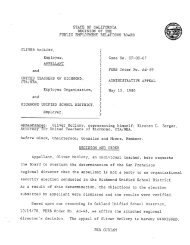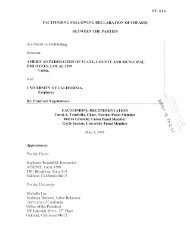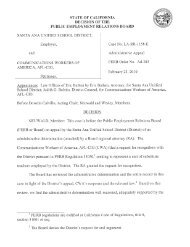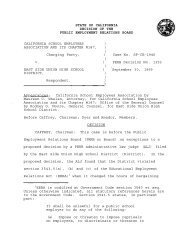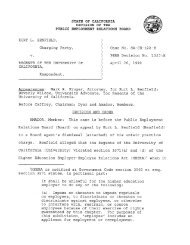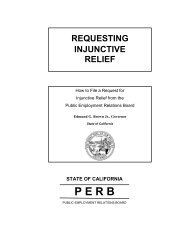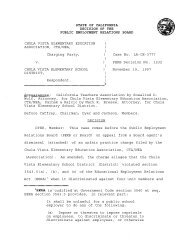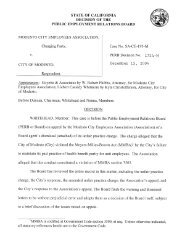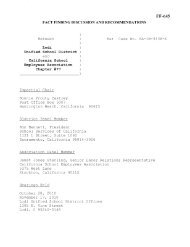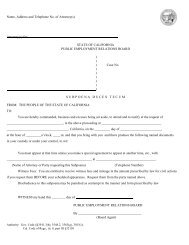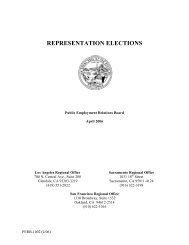FF-676 - Public Employment Relations Board
FF-676 - Public Employment Relations Board
FF-676 - Public Employment Relations Board
Create successful ePaper yourself
Turn your PDF publications into a flip-book with our unique Google optimized e-Paper software.
Article 1 S- Transportation<br />
District Position-The District proposes modifying Article 15.9, which addresses after<br />
hours transportation dispatching. The District proposes that this particular duty be<br />
compensated by paying employees for actual hours worked with a 15-minute<br />
minimum for each incident. Currently, 3 bargaining unit employees rotate this duty<br />
during evenings and weekends. During 2010-11 and 2011-12, each emp~oyee made<br />
approximately $30,000.00 each year in overtime pay, although one employee made<br />
close to $40,000.00 in overtime pay in 2010-11. On a percentage basis, the 3<br />
employees have earned an average of approximately 45% additional earnings due to<br />
their overtime. The District points out that this is a significant -financial issue relating<br />
to wages, albeit applicable to three employees.<br />
Union Position-The Union opposes the District's proposal. The Union introduced<br />
testimony to the effect that this practice has been in place for some time in at least 2<br />
variations. Initially, there was unlimited overtime available, but at some point, the<br />
overtime on weekends was limited to 10 hours per day. Although most of the duties<br />
can be handled by cell phone from home or other off site locations, occasionally, the<br />
employee on duty has go into the field to resolve a problem. When on after hours<br />
duty, an employee has to remain in the area and cannot drink alcohol, so there is some<br />
restriction on their personal activities. Adoption of the District's proposal would<br />
abruptly and significantly reduce each employee's income.<br />
Panel Discussion/Recommendation· The District's primary argument is that, in view<br />
of its fmancial condition, the cost of after hours transportation dispatching is<br />
excessive and needs to be reduced. It offered no evidence, however, regarding how<br />
.other types of after hours coverage, if any, are handled internally or externally. The<br />
Panel recognizes the District's need to reduce its costs and the District's pn;>posal<br />
would be a step in that direction. Yet, the District's proposal would not eliminate<br />
overtime, it would only reduce it. The actual amount of the reduction is unknown.<br />
Conversely, the 3 employees affected by this change would suffer a reduction in<br />
compensation significantly above and beyond what other unit and. District employees<br />
will experience due to furloughs and suspension of personal necessity days. This<br />
disproportionate result strikes the Panel as unfair, especially in view of the fact that<br />
this issue involves only 3 employees and there were no comparables produced to<br />
show whether this pay is excessive, typical, or low. Accordingly, the Panel<br />
22



